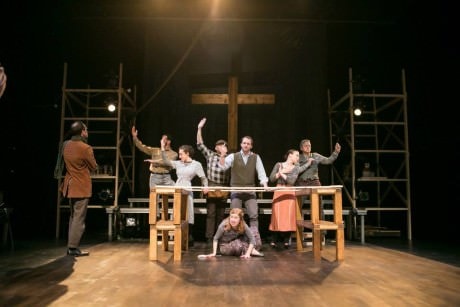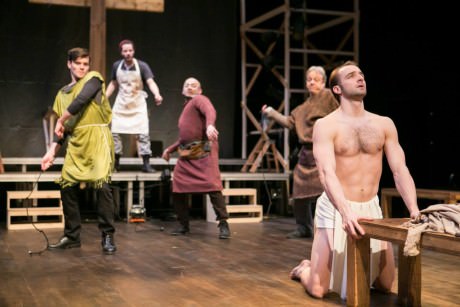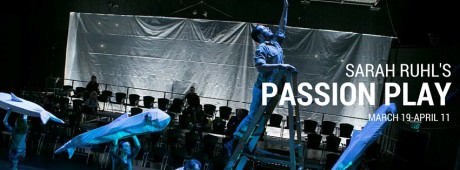After Michael Poandl and John Stoltenberg, both DCMTA writers, saw a recent performance of Passion Play at Forum Theatre, they found themselves chattering back and forth trying to figure out why the production had so engaged them—and in particular: Why had its three-and-a-half hours seemed to fly by as if in some other theatrical dimension of time? John proposed to Michael that they turn their inquiry into keystrokes so as to capture a conversation that could be overheard. Michael jumped at the idea.

John: When I looked at my watch at the end of Passion Play and it was near midnight, I was kind of shocked. It was if typical conventions of narrative and stagecraft had somehow left off or been left behind and I had been in some twilighty zone of performance experience, just letting it happen to me in some free-flowing free-associational way. What the heck was that?

Michael: I felt the same, and more than that, I felt energized after each of the play’s three acts. I was physically tired to be sure, as it was coming to the end of a very long week for me. But I felt like my mind was refusing to back down. I don’t think that the length of a play is irrelevant, or that it even serves at the pleasure of the story. In other words, I don’t believe this is a three-and-a-half-hour play simply because it needs to be that long to tell the story. I think the length itself should be considered as an independent characteristic worthy of analysis and critique. You mentioned the “novelistic” tendencies of the play, and I completely agree. In so much of modern communications, the goal is always to cut, cut, to streamline and make a text more concise. What if a modern editor had to go through a book by Hugo or Dostoyevsky, or Marx for God’s sake? There is something to be said about taking audiences on a journey. During both intermissions, I found myself aching to know what the next act would be. When I think of the shape of the narrative of the show, I don’t see a line, or an arc, or even a spiral; I see the undulating curves of the giant fish that float across the space. It dips, it soars, it comes back round again. And I was enthralled.
John: Yeah. And I loved the staging–the “poor theater” approach, with all the bare-wood-built set pieces and scaffolding and lighting equipment and ladders and rolling hampers all in plain sight. Plus the lighting design was brilliant. You said the lighting was like a character in the play, and it was—a living, changing presence, completely integrated with the performance presence of the acting ensemble. That vast expanse of plastic sheeting surrounding the black box that would erupt in red or sparkle with stars—it made the space feel like an otherworldly planetarium. Everything about the stagecraft was endlessly fascinating.
Michael: I very much subscribe to the belief that artists should make choices appropriate to their medium. With the invention of photography, the purpose of painting was no longer to depict reality with as much verisimilitude as possible. This opened the gates for the Impressionists and eventually the Modernists and abstraction. Likewise, with the high production values and stunning visual effects of film and television, there is no reason for theatre to bear the responsibility of dazzling the eye through high technology and other spectacle. This is why I love the poor theatre. It embraces the material-ness of its materials. Wood is allowed to be wood, plastic is allowed to be plastic, stage lights are allowed to be stage lights. Nothing is hidden, but everything is arranged. It becomes a sculptural and temporal poem. The text is obviously a part of it, but I don’t think that it was the writing that kept me glued to my seat for four hours. It was the staging, and more specifically, the knowledge that I was experiencing something that I could not experience in a movie theatre or at home watching Netflix. I was experiencing theatre as a verb.

John: I like that. Another great thing about “poor theater”—as the innovation was named by the legendary Polish director Jerzy Grotowski—is that it foregrounds the actors. Their performance is not only the means by which we perceive character and narrative; their performance becomes the medium by which we see common stage objects and imagine we are seeing extraordinary stage effects. For instance in Passion Play when there’s that choreographed scene of actors holding big fish puppets and we “see” a school of giant sea creatures, or when actors wheel in ladders on which are perched actors holding plain white cloth and we “see” sailing ships—that sort of thing keeps happening and happening in Passion Play and we are transported into some unreal time and space by a “reality” actors create before our eyes. I remember vividly in Act Three when it’s dark and an actor swoops onstage carrying two worklights and approaches what had been established as a toll booth (represented by an actor on a ladder with an empty paint can), and I jolted in my seat because for a split second I experienced the effect as the oncoming headlights of a car speeding toward me. Something was happening in my imagination prompted by the imagination going on in the acting and staging that kept being amazing.

Michael: Yes, yes! I had a similar moment very early on when an actor explicitly established one light as the sun, and the other as the moon. I thought, “Yes, okay, this is the sun and that is the moon. I will accept your invitation to imagine.” And for the rest of the play, I saw those lights as the sun and moon, just like I saw the ships and the fish. It totally empowers the actors as masters over their particular imaginative space, but it also empowers the audience as implicit participants in the shared theatrical experience.
But now I want to throw a monkey wrench into all of this. I want to talk about the thematic content of Passion Play, because that is the aspect that I found equally intriguing, but less obvious than the brilliance of the staging. I walked into the play expecting it to be a play about religion, and it is to some extent. But as we’re talking, I’m wondering now if it’s really a play about theatre. In Act I the passion play is a religious act, and a political act in the face of the English Reformation. In Act II the passion play is about community and family and tradition. In Act III this gradual professionalization and politicization of the passion play occurs. Do you think this is a comment on how the role of Western theatre has changed in the past four centuries? Or perhaps on how ritual itself survives in the face on an increasingly secular and bureaucratic society? The other important piece that I keep turning over in my head is the red sky. Again, the red sky itself, projected on the plastic tarp surrounding the space, was gorgeous, and I enjoyed it for the sake of its aesthetics. But I must admit that its meaning in the context of the play is ambiguous to me. Perhaps its periodic appearance represents a sort of porous border between the three historical epochs, a sort of portal for reincarnation? Or maybe it is the presence of God himself, and as society becomes more secular, the literal redness of the sky disappears? I’m not sure I can close the book on Passion Play until I have some idea of what it was about, beyond the gorgeous execution of its theatricality.
John: I agree that Passion Play’s “aboutness” felt elusive. The substance certainly had much less to do with religion in the sectarian sense than I expected. Even all the biblical borrowings seemed to be about something else—seemed to be pointing us to something else—not really purporting to be “meaningful” in themselves. I like your notion that Passion Play—certainly in this production—is a play about theater. And I’d add that—at least as conceived and directed at Forum—it’s a play that evokes and resonates with the religious origins of theater. The way the actors enter before each act and chat with the audience and one another as they put on costume pieces right in front of us—they seemed simple commoners like us until they assumed roles and spoke poetic yet idiomatic speeches. And it was as if they then transformed into secular officiants in a communal theatrical ritual that tapped into our collective longing for reverence and meaning through metaphor—something completely other than any specific creed or any particular cultic belief. The human-all-too-human story lines that threaded and wove through the three acts seemed to reflect back to us and celebrate our own commonality as participants in a theater experience. Did I just make any sense there?
Michael: Haha yes, you did. From the very beginning, Passion Play is explicitly self-conscious about its status as a play. And in the same way that it asks the audience to believe that a pair of worklights is a set of headlights, it asks us to believe in a multitude of characters who we know are not real, by the actors’ own admissions. And really, passion plays themselves are tributes to the power of imagination. The villagers of Act I and Act II know that the actors playing Mary and Jesus and Pontius Pilate are not those people, and yet… If the play is endowed with the proper amount of significance, perhaps the community can get closer to God, via a ritualized performance. It reminds me of the flight manager’s speech in Act I, where he praises his patented pulley system as a very real way to get closer to God. Ultimately, Passion Play may not be so much about theatre or religion or even ritual, but about imagination. It is the power of collective belief that animates both religion and theatre, and the ontological “realness” of either may very well be beside the point. The collective imagination doesn’t color reality, it is reality. And that opens the doors to sculpt human experience in any shape. It can make virgins pregnant, messiahs resurrect, and even mortal men fly. Truly, that is a passionate way to live.
Passion Play plays through April 11, 2015 at Forum Theatre, performing at the Silver Spring Black Box Theatre – 8641 Colesville Road, in Silver Spring, MD. For tickets, buy them at the door, calling the Box Office at (301) 588-8279, or purchase them online.
LINK:
Robert Michael Oliver’s review of Passion Play on DCMetroTheaterArts.






I enjoyed the palaver format because it allowed the two reviewers to expand upon each others perceptions and insights and thus share them with us. It was like eavesdropping on personal musings.